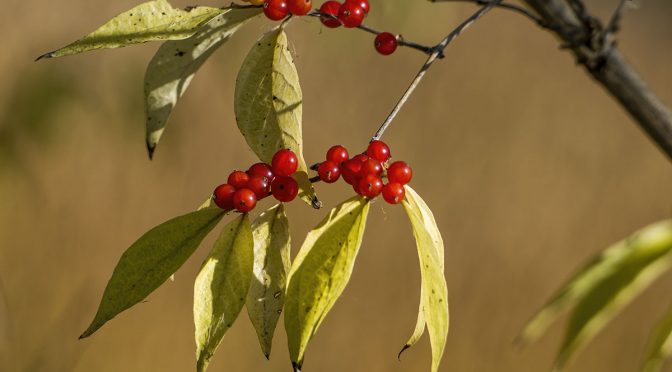This article discusses the practical aspects of substituting foliage for birds when we are out with our cameras. In late October I was doing some field testing with our newly acquired M.Zuiko 75-300 mm f/4.8-6.7 II zoom lens at Hendrie Valley. For much of my hike my feathered friends were simply not cooperating and nowhere to be found. So, substituting foliage for birds made sense.
NOTE: Click on images to enlarge.

At first blush this subject substitution may seem a bit odd. When doing bird photography many of us would be out with a camera and one lens. Most commonly a long telephoto zoom.

It is easy to forget that this type of lens has an important characteristic that makes it a very good choice for photographing flowers and foliage. Let’s consider depth-of-field. We know that using a longer, telephoto focal length will have shallower depth-of-field when compared to a shorter, wide angle focal length when shot at the same aperture.

If we use our zoom lens at the longer end of its telephoto range we can achieve shallow depth-of-field. Even when using a smaller sensor camera. When we choose subjects where the background is very distant, as seen in the image above, we can achieve very good subject separation. And, a smooth, out-of-focus background. One of the keys to this technique is to move in close to our subject as you can see with the EXIF data.

As you compare the image above to the next three that follow, you will be able to clearly see the importance of the distance between subject and background.



It can be a bit challenging to find the right combination of lighting, focal length, focusing distance to subject, and distance from subject to background. Once we make the mental switch from photographing birds to foliage, our eyes see opportunities we may have missed before.

We may place our auto-focus point on one edge of a single leaf in a cluster.

Purposely underexposing a leaf in bright sunlight, then further darkening the background in post can create a high contrast image.

Finding a solitary leaf and incorporating a corner exit and equidistant composition in our photograph can give it a good sense of balance and can help eye flow.

We can use classic rule of thirds composition technique, and adjust the zoom on our lens to create the exact composition we desire.

Looking for monochromatic backgrounds can help create good subject separation.

It can also be helpful to change our shooting angle when photographing foliage. In the case of the image above, I tilted my camera about 45-degrees to give the berries a horizontal perspective.
 OM-D E-M1 Mark III + M.Zuiko 75-300 mm f/4.8-6.7 II @ 300 mm, efov 600 mm, f/7.1, 1/640, ISO-250, subject distance 2.5 metres
OM-D E-M1 Mark III + M.Zuiko 75-300 mm f/4.8-6.7 II @ 300 mm, efov 600 mm, f/7.1, 1/640, ISO-250, subject distance 2.5 metres
Substituting foliage for birds can be an enjoyable exercise. One that helps encourage us to be more flexible and adaptable when out with our camera gear.
Another potential benefit of substituting foliage for birds is that we may create some images that could be fun to work with in terms of photo art treatments.
Technical Note
Photographs were captured hand-held using camera gear as noted in the EXIF data. Images were produced from RAW files using my standard process.
How you can help keep this site advertising free
My intent is to keep this photography blog advertising free. If you enjoyed this article and/or my website and would like to support my work, you can purchase an eBook, or make a modest $10 donation through PayPal. Both are most appreciated. You can use the Donate button below. Larger donations can be made to tom@tomstirr.com through PayPal.
Word of mouth is the best form of endorsement. If you like our website please let your friends and associates know about our work. Linking to this site or to specific articles is allowed with proper acknowledgement. Reproducing articles, or any of the images contained in them, on another website or in any social media posting is a Copyright infringement.
Article and images are Copyright 2020 Thomas Stirr. All rights reserved. No use, duplication or adaptation of any kind is allowed without written consent. If you see this article reproduced anywhere else it is an unauthorized and illegal use. Posting comments on offending websites and calling out individuals who steal intellectual property is always appreciated!


Excellent lesson!
Thanks Jim!
Tom